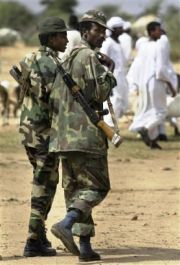Arab militia work with Sudan army in Darfur town
Nov 4, 2006 (TINE, Sudan) — Sudan may deny that its army cooperates with the Arab militia at the heart of the Darfur conflict, but in Tine, on the border with Chad, little trouble is taken to hide the fact.
 The militiamen, known locally as Janjaweed, arrived in Tine last week and set up base jointly with the Sudanese army to protect the strategic site against attack by Darfur rebels.
The militiamen, known locally as Janjaweed, arrived in Tine last week and set up base jointly with the Sudanese army to protect the strategic site against attack by Darfur rebels.
Heavy gunfire day and night keeps African Union peacekeepers on the alert, and vehicles packed with shouting soldiers tear along dirt tracks.
“Here in Tine it is very clear … that the Janjaweed are working hand in hand with the government troops who are here,” said Thomas Chaona, acting commander in the Tine sector of the ill-equipped AU force struggling to monitor a notional truce in remote western Sudan.
Khartoum armed the mainly Arab militiamen in early 2003 to quell a revolt in Darfur by mostly non-Arab rebels. The Janjaweed stand accused of a campaign of rape, murder and pillage which Washington calls genocide, a term Sudan rejects.
Under an AU-brokered peace deal signed in May with only one of three negotiating rebel factions, Khartoum promised to disarm the Janjaweed, a term loosely derived from the Arabic for ‘devils on horseback’, by Oct. 22.
But one day after the deadline, about 1,000 Janjaweed rode into Tine, terrifying the few hundred residents, who fled across the border to Chad.
The militiamen denied AU requests to meet their commander and blocked the road to town, which ran past their base.
A Sudanese army source denied there were any Janjaweed in Sudan. “These are border intelligence troops, a force created one year and three months ago,” he said. But the ragged youths, many in civilian clothes with rifles slung across their shoulders, did not resemble trained intelligence troops.
Tine market, now devoid of civilians, is teeming with heavily armed men and vehicles with no Sudanese army markings.
Asked where the civilians were, one armed man shouted: “There are no civilians here and we don’t want any civilians here,” cocking his weapon threateningly.
‘IT’S CHAOS’
A local Sudanese army commander told his senior army representative accompanying an AU patrol through the town: “It is chaos here,” before his superior silenced him.
The young militiamen surrounded an AU vehicle, threatening the journalists inside, and even the Sudanese army officer had a tough time calming down the unruly gunmen.
Tine is the last main town on the frontline of Darfur’s new war between government troops and a new rebel alliance called the National Redemption Front (NRF), formed after the May deal.
The NRF dealt two heavy blows to the government in North Darfur in the past two months, according to the AU and the United Nations.
The top U.N. envoy to Sudan, Jan Pronk, has said Sudanese army morale is low, generals have been sacked and soldiers are refusing to fight. Observers say this is why the Janjaweed are in town, and that more are expected to move north.
Experts estimate 200,000 people have been killed in three and a half years of fighting in Darfur, and 2.5 million forced to flee their homes. The International Criminal Court is investigating alleged war crimes there.
Tine Sudan and Tine Chad are separated only by a dry river bed. The border crossing is now firmly closed because of the growing tension between the two countries and the fact that the Darfur conflict has spilled over the border, displacing tens of thousands of Chadians.
Last week, Chad accused Sudan of bombing four Chadian towns, which Khartoum denied. “Anyone coming from Sudan now is considered an enemy of Chad,” a Chadian immigration official said.
But the cold war between the two nations, each of which accuses the other of supporting rebel groups, is considered unlikely to develop into full-scale international conflict.
“Chad has its internal problems and Sudan has its own problems,” said Chaona, the local AU commander.
(Reuters)
